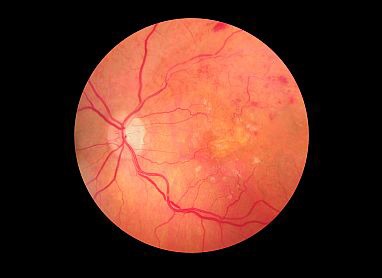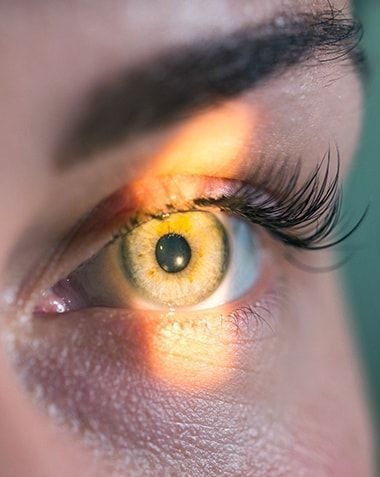Diabetic Eye Disease

We are fully equipped with cutting-edge diagnostic and treatment tools, including
- Indirect Ophthalmoscopes
- Optical Coherence Tomography (OCT)
- AngioVue Non-Invasive OCT Angiography
- Green Laser Systems (delivered via slit lamp and indirect ophthalmoscope) for precise laser treatments
Beyond medical and surgical interventions, our approach is holistic and patient-centered. Every diabetic patient is educated on managing their condition through diet, exercise, stress reduction, and lifestyle modification. We also emphasize the role of meditation and regular follow-up in preserving long-term eye health.
At Dr. Daljit Singh Eye Hospital, we combine technology, experience, and compassionate care to offer comprehensive solutions for diabetic eye disease.
What Does Diabetic Eye Disease Mean?
Diabetic Eye Disease refers to a group of eye conditions that can develop as a result of long-term diabetes. High blood sugar levels can damage the tiny blood vessels in the eyes, particularly in the retina, the light-sensitive layer at the back of the eye.
Does Every Person with Diabetes Develop Diabetic Eye Disease?
Not all individuals with diabetes will develop diabetic eye disease, but everyone with diabetes is at risk. The chances increase the longer a person has diabetes and if their blood sugar, blood pressure, or cholesterol levels are poorly controlled.
Regular eye examinations are crucial because diabetic eye disease can develop silently, without noticeable symptoms in the early stages. With timely detection and proper management, vision loss can often be prevented.

How Can Diabetic Eye Disease Be Avoided or Kept Under Control?
Diabetic eye disease can often be prevented or slowed down through careful management of your overall health. The key steps include
- Maintaining healthy blood sugar levels
- Controlling blood pressure and cholesterol
- Following a balanced diet and exercising regularly
- Avoiding smoking and managing stress
- Scheduling regular eye check-ups, even if there are no symptoms
Early detection is critical—routine screening allows doctors to catch changes in the eye before vision is affected. With the right lifestyle choices and timely treatment, the risk of serious eye complications from diabetes can be greatly reduced.
How Is Diabetic Eye Disease Diagnosed?
Diabetic eye disease is detected through a series of specialized eye examinations that allow the doctor to assess the health of your retina and blood vessels in the eye. These may include
- Dilated Eye Exam – Drops are used to widen the pupils so the retina can be thoroughly examined.
- Fundus Photography – Detailed images of the retina are taken to spot any signs of damage.
- Optical Coherence Tomography (OCT) – A non-invasive scan that shows cross-sectional images of the retina, revealing swelling or fluid buildup.
These tests help detect early changes—even before vision is affected—allowing for timely treatment and better outcomes.

OCT Angiography (OCTA)
OCT Angiography (Optical Coherence Tomography Angiography) is a non-invasive imaging technique used primarily in ophthalmology to visualize blood flow in the retina and choroid without using dye. It captures high-resolution, cross-sectional images by detecting motion contrast from moving red blood cells, allowing doctors to assess microvascular health in detail.
Key Features
- on-invasive: No need for intravenous contrast (unlike fluorescein angiography).
- High-resolution imaging: Provides detailed 3D images of retinal and choroidal vasculature.
- Fast and safe: Quick scan with minimal patient discomfort and no risk of dye-related allergic reactions.
How Is Early Diabetic Eye Disease Treated?
In the early stages, diabetic eye disease is typically managed with a procedure called laser photocoagulation, using a green laser. This treatment targets the outer areas of the retina, sparing the central part (macula), which is responsible for sharp vision. The laser helps seal leaking blood vessels and prevents further damage to the retina.
Why Are Injections Given in the Eye for Diabetic Eye Disease?
Sometimes, diabetes causes swelling or bleeding in the macula, the part of the eye that helps you see fine details. This can lead to blurry or reduced vision. Since lasers can’t be used safely in this central area, doctors give special injections into the eye. These contain Anti-VEGF medicine, which helps reduce swelling, stop bleeding, and may improve vision.
What Can Be the Result of Diabetic Eye Disease?
If not treated in time, diabetic eye disease can lead to progressive vision loss and even permanent blindness. However, with early detection, proper treatment, and good control of diabetes, many patients are able to preserve their vision and lead a normal life. Regular eye check-ups and healthy lifestyle choices play a key role in improving long-term outcomes.
How Is Advanced Diabetic Eye Disease Treated?
In advanced cases, where there is bleeding or retinal detachment, eye surgery may be needed. A procedure called vitrectomy is done using special machines to remove blood and repair the retina. Lasers and injections into the eye may also be used along with surgery. These treatments help control the disease and save vision, but early treatment always gives better results.




